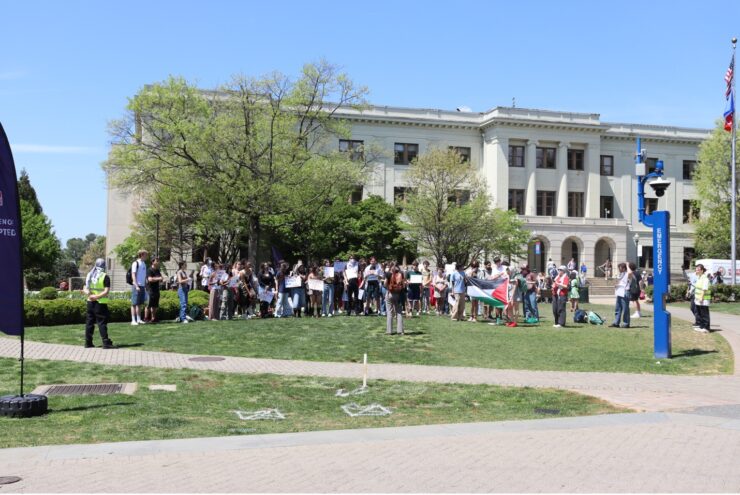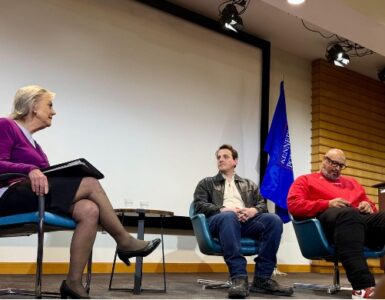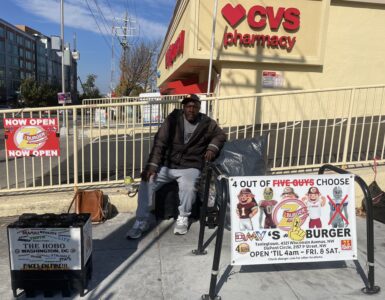By Gwyneth Hill
Jack MacCallum, a neuroscience major at American University, runs around all day. As a senior, he balances classwork, hanging out with his friend group, and working as a research assistant. A normal student by any other means, except that his personal information lives on the internet dangerously outside of his control.
One night last year, during an open mic night at the Bridge Café on campus, his friend showed him an Instagram video– of him. The post showed MacCallum tearing down posters that displayed photos of those kidnapped by Hamas with a caption asking viewers to “expose him.”
He ran to the bathroom, sick to his stomach, and began to read the comments. “I just see this photo of me, and I go through the comments, and they are all like, ‘he deserves the electric chair,’ ‘he should not be working in academia,’ ‘he’s a terrorist,’’ MacCallum said. “The night it happened, I stayed in the lab until 3 or 4 in the morning because I was scared to walk across campus.”
Although he knew someone had recorded him that night, he never imagined it would lead to this.

In the following days, more posts would be created on different websites. Master profiles compile everything from his social media accounts, the school he attended, the clubs he participated in, and photos of him.
This weaponization of personal information due to political differences is often referred to as “doxing” or “doxxing.” In the wake of the conflict in Gaza, websites have become a prominent way to share information about college students, professors, and faculty who are deemed opponents of Israel.
Researchers at the University of Illinois, Chicago, found that young adult men are often the perpetrators and victims of doxing. After following popular websites Pastebin, 4chan, and 8ch for four months, they found more than 5,000 posts to be doxing.
Canary Mission, one of the most prominent doxing websites, features MacCallum with a dozen more people affiliated with American University. However, MacCallum urges people not to engage with the site, as every click boosts the number of targeted individuals in Google searches.
According to another A.U. affiliate who was doxed on the site, they spent over $1,000 on search optimization services to bury their exposed information and reduce the chances of people finding it. The source, after receiving threats and sustained online harassment resulting in the need for therapy, has requested anonymity and will be referred to as “A.U. affiliate.”
After growing up watching the Iraq War and later the Syrian War unfold on the news, the affiliate said they were “introduced to concepts of needless war and exploitation at a young age.” And as they got older, they began to express their support for the Palestinian conflict on Twitter. But one day, the self-proclaimed “social media addict,” said they too found a detailed index of their information scraped from their LinkedIn, Twitter and Facebook.
They said it felt like they were in the Twilight Zone when they found out. “It put a pause on everything, it shook up everything,” the affiliate said.
Canary Mission believes that like the canaries used to detect toxicity in coal mines they too can warn others of alleged bigots or antisemites on college campuses. Their mission statement says, “We pursue our mission by presenting the words and deeds of individuals and organizations that engage in anti-Semitism, racism and bigotry on the far right, far left and among the array of organizations that comprise the anti-Semitic Boycott, Divestment, Sanctions (BDS) movement.” Canary Mission did not respond to a request for comment.ƒ
The website now calls for “uncovering foreign nationals”. It includes information about students, including Mahmoud Khalil and Momodou Taal, who have been taken into U.S. Immigration and Customs Enforcement (ICE) custody. Their detainment followed the signing of Executive Order 13899 by President Trump, which expanded the grounds for deportation of non-citizens found in violation of any immigration-related regulation.
But Farah Afify, Research and Advocacy Manager at the Council on American-Islamic Relations, said what Canary Mission is actually doing is cyberbullying students to scare them from speaking up.
“The students are challenging the Israeli government, and they’re challenging the United States’ government support of Israel,” Afify said. “And I believe that what we see in response are organizations and individuals attempting to damage their reputations as a consequence of engaging in that form of speech and calling for human rights.”
Daniel Trottier, an expert in global digital media and professor at Erasmus University Rotterdam, wrote in the Global Crime Journal that while doxing can lead to job loss or a damaged reputation for an individual, it can serve as a warning to a group. “Such denunciations play a disciplining role to audience members who may identify with the target, for example, as members of the same minority group,” he wrote.
After meeting him, Fatima Brandes, a close friend of MacCallum, learned about doxing and quickly saw its impact. “I think it just affected him in the way that he knew people could find his address, see where he works – and some people were contacting the people he works with,” Brandes said. “People just seemed to be paying more attention to him.”
And virtual glares became real as MacCallum said he was also publicly recognized.
One day, while getting a new tattoo, he noticed two people staring at him, looking at their phones and loudly saying, “Yeah, that’s him.”
“I’m definitely a little more anxiety-prone and cautious in what I do now,” he said.
The affiliate said that with each post, they continued to battle Twitter, Google and other websites to have their information removed, constantly questioning, “How is this even legal?”
CAIR in Maryland continues to push Bill 889 to give greater protections to students like MacCallum, as the United States largely lacks doxing laws. Afify said that without these measures, students will continue to be harmed.
But MacCallum does not regret the actions that led to his doxing. He viewed the tearing down of posters as an act of protest.
“If my name is going to get blasted, at least it’s getting blasted for saying ‘I support human rights,’” MacCallum said.
And for the affiliate, it’s hard to know what the exact consequences of their online exploitation have been in the four years since. Maybe employers saw their online presence and denied their application, or maybe they would not have needed therapy, or maybe they wouldn’t be as strong now.














Add comment